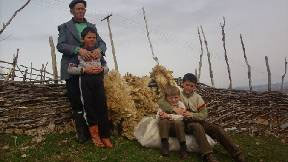
Two generations of the Cucak family- Fikret Cucak and the youngest grandsons. Although they attend primary school, they help with the sheep.
Organised in an Agricultural Cooperative, the cattle breeders from Mt. Pester solved the problem of wool purchased and sold to a buyer from England.
Sjenica is one of the most spread and least developed municipalities in Serbia. It occupies the territory of 1059 square kilometres. 34,000 inhabitants live in the town and the surrounding 103 villages. At the heart of the Pester Plateau, central Sandzak, the high altitude and severe climate are not suitable to agriculture development. But, the vast pastures are very good for cattle breeding – sheep, in particular.
Over the past two decades, with the ruination of the social combine, the agricultural producers were largely left to their own resources. In addition to obsolete machinery, and ignorance of new technologies in cattle breeding, the farmers from Pester faced a problem of sale of cheese, milk, livestock and wool storage after the mandatory sheering of herds. They piled wool that noone wanted to buy out in attics and sheds.
Thanks to a component of the „Project for Development of Sandzak villages ” implemented by the UN Food and Agriculture Organisation (FAO) since 2003, the Pester farmers resolved some of their problems. Importantly, they have managed to gather together in an Agricultural Cooperative. Today, the wool from Pester is sold to a buyer in England.
– FAO has a standard of operation that we have been implementing here since 2003. We do not present ready-made solutions, but enable our hosts to identify the problems. We also build their capacities for finding solutions by themselves – says Sasa Martinov, FAO National Project Manager.
In the first year of implementation they organized expert lectures. Pilot fields were planted in order to prove that the leguminous plants could be produced on Pester. Production of milk increased following the change of food given to cattle.
Gradually the problem of wool was also resolved. An expert from New Zealand taught them the secrets of electric sheering. The FAO office mediated in the first contacts with the buyer from England.
Edib Rahic, manager of the Agricultural Cooperative „Sjenica Sheep” says that the first truck with wool started from Sjenica for England in 2005. Ever since, each year three 15 ton trucks leave for England. 15 to 4,000 kg of wool are purchased from households at the price of RSD 40 which is three times more than the price of the purchase prior to establishment of the Cooperative. Packaging machines were also purchased. Although of average quality, the inhabitants of Sjenica managed to complete purchase in Sumadija.
Fikret Cucak has been involved in the project from the very beginning. He took the training for electrical sheering and his household was one of the first to sell the wool. He now helps sheer a herd of 120 sheep in a day – it used to take several days in the past. Fikret and his colleagues now go to other villages and to Montenegro where they can also earn by electrical sheering of sheep.
The purchase of wool contributed additional funds for the budgets of, mostly, elderly and poor families of cattle breeders from Pester.
 Government of the Republic of Serbia
Government of the Republic of Serbia














 pdf [271 KB]
pdf [271 KB]
Leave a Comment